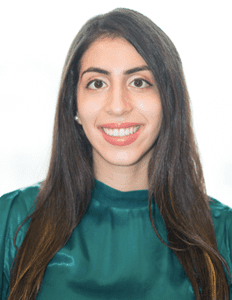 Meena Alnajar is an IPilogue Senior Editor, IP Innovation Clinic Senior Fellow and 3L JD Candidate at Osgoode Hall Law School.
Meena Alnajar is an IPilogue Senior Editor, IP Innovation Clinic Senior Fellow and 3L JD Candidate at Osgoode Hall Law School.

On November 9, IP Osgoode, Reichman University and Microsoft hosted the first in-person Bracing for Impact Conference since 2019. The conference focussed on “The Future of AI for Society.” While AI is full of exciting possibilities, real-world application and integration are relatively nascent. Implementing AI technology in society requires complex interdisciplinary engagement between engineers, social scientists, application area experts, policymakers, users, and impacted communities. At the conference, an esteemed lineup of speakers across disciplines discussed the forms that interdisciplinary collaboration could take and how AI can help shape a more just, equitable, healthy, and sustainable future.
Spot was one of many unforgettable guests at IP Osgoode’s Bracing for Impact Conference. A four-legged metal friend, Spot is an inspection robot from Boston Dynamics that explores hazardous spaces to capture digital images and generate mapping data. Currently, Spot is used by MFE Inspection Solutions, Boston Dynamics’ North American partner. Spot is tasked with gathering data in hazardous spaces, such as construction sites and mines. The hope is that Spot can reduce harm and liability that stem from working in dangerous spaces. Spot has pre-assigned walking routes over huge expanses. While walking, Spot can take images through a mounted camera. We watched Spot scan a symbol resembling a QR code on the wall before completing its pathway. Spot also avoided obstacles, such as a large box in its way, by walking over the obstacle, walking backwards, or walking around it. MFE Inspection Solutions has other inspection drones that create 3D maps, but Spot was the four-legged star of the conference, with the flexible limbs necessary to enter these spaces and promote workplace safety.
The Bracing for Impact Conference closed with two impactful announcements: the launch of York University’s Center for AI and Society (CAIS) and the IP Osgoode David Vaver Medal of Excellence in Intellectual Property Law Award Ceremony.
Launch of the York University Centre for Artificial Intelligence & Society

Photo by Buda Photography
Dr. Amir Asif, Vice President of Research and Innovation at York University, introduced the Centre for AI and Society. Given that York has an edge in its application of AI in its academic programs, this Centre is dedicated to addressing AI’s ethical issues to ensure AI is applied to society’s benefit. Directors Professor Pina D’Agostino, Associate Professor at Osgoode, and Professor James Elder, Professor and York Research Chair in human and computer vision, lead the centre. The Centre is the positive result of York’s AI Task Force, whose report “Fostering the Future of AI” demonstrated that an organized research unit was needed to examine AI’s impacts on society. The Centre brings members from seven faculties together to understand AI’s potential, mitigate AI’s risks, and make AI use more inclusive. The Centre is currently partnered with Microsoft and is a collaborative mission that will hopefully expand to include more members to investigate how AI can empower society.
IP Osgoode David Vaver Medal of Excellence in Intellectual Property Law Award Ceremony

Photo by Buda Photography
For the first time since 2018, the IP Osgoode David Vaver Medal of Excellence in Intellectual Property Law was presented in person. This award recognizes students who are involved with and committed to IP law during their time at Osgoode. Toronto-based artist and designer for the Royal Canadian Mint Aries Cheung designed the medal. The Honourable Justice Rothstein and Professor Vaver presented the award. Justice Rothstein remarked, “medals and awards are named after people for a reason; this one carries Professor Vaver’s name … he is one of the foremost academics of our generation.” Justice Rothstein highlighted Professor Vaver’s achievements, such as being cited 23 times by the Supreme Court of Canada, an impressive feat considering how few IP cases are argued at that level.
Each recipient offered reflections on the award and hopes to engage with AI in their future career. The 2019 recipient, Aviv Gaon, remarked that the medal reflects the highlights of his rich academic journey. The 2020 recipient, Ian Stedman, pointed out that AI has tremendous potential to help those with rare diseases. The 2021 recipient, Ryan Wong, hopes to exude some of Professor Vaver’s qualities, such as his rigour and spirit. Wong urged us to be ready to tackle complicated issues as we approach the inevitable: the inclusion of AI in our society. This year’s recipient, Bonnie Hassanzadeh, told the audience that IP Osgoode helped her find purpose and commitment in her law student experience and she looks forward to the future of AI and precision medicine.
Professor Vaver concluded the ceremony with a reminder: In IP law, you cannot be a hedgehog, a creature who knows only to roll into a ball. Rather, we must be foxes, remaining flexible and knowing many things deeply. This award serves as a reminder to be creative and invested in new ideas, as these skills are essential in the practice of IP law.

